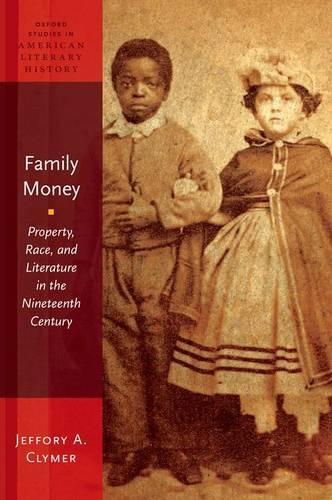Overview
Family Money explores the histories of formerly enslaved women who tried to claim inheritances left to them by deceased owners; the household traumas of mixed-race slaves; post-Emancipation calls for reparations; and the economic fallout from anti-miscegenation marriage laws. Authors ranging from Nathaniel Hawthorne, Frank Webb, and Harriet Beecher Stowe to Charles Chesnutt and Lydia Maria Child recognized that intimate interracial relationships took myriad forms, often simultaneously sexual, marital, coercive, familial, pleasurable, and painful. Their fiction confirms that the consequences of these relationships for nineteenth-century Americans meant thinking about more than the legal structure of racial identity. Who could count as family (and when); who could own property (and when); and how racial difference was imagined (and why) were emphatically bound together. Demonstrating that notions of race were entwined with economics well beyond the direct issue of slavery, Family Money reveals interracial sexuality to be a volatile mixture of emotion, economics, and law that had dramatic, long-term financial consequences.
Full Product Details
Author: Jeffory A. Clymer (Professor of English, Professor of English, University of Kentucky)
Publisher: Oxford University Press Inc
Imprint: Oxford University Press Inc
Dimensions:
Width: 23.40cm
, Height: 1.30cm
, Length: 15.60cm
Weight: 0.336kg
ISBN: 9780190223878
ISBN 10: 0190223871
Pages: 216
Publication Date: 29 January 2015
Audience:
College/higher education
,
Professional and scholarly
,
Tertiary & Higher Education
,
Professional & Vocational
Format: Paperback
Publisher's Status: Active
Availability: Manufactured on demand

We will order this item for you from a manufactured on demand supplier.
Reviews
Engaging and smartly conceived, Family Money shows the way interracial sex and intimacy has functioned as a volatile 'switching point' for distributions of wealth among black and white Americans. By examining legal cases, economic patterns, and racialized inheritance plots in fiction, Jeffory Clymer contends that the race concept itself is the product of an economic struggle. This innovative and beautifully written book is a must-read for students of the period. --Nancy Bentley, author of Frantic Panoramas: American Literature and Mass Culture, 1870-1920 Family Money is a terrific book. Deeply researched and threaded through with persuasive careful readings, it brings a fresh angle to bear on the relations of fiction to law in nineteenth-century America by focusing brilliantly on the ways that interracial relationships entwine race with economics. It will interest anyone concerned with American literature, law and literature, African-American studies, and the cultural development of the novel in America. --Laura Korobkin, author of Criminal Conversations: Sentimentality and 19th-Century Legal Stories of Adultery Jeffory Clymer's creative and resonant readings of American fiction map a complex, ever-shifting terrain of race, gender, and property from slavery to Jim Crow. His insights--and the alternative emotional economies imagined by American authors--reveal important new ways to think about the role of law in the history of race in the United States, and force us to acknowledge the extent to which we still live in a society defined by a persistent and deliberately constructed racial wealth gap. --Daniel J. Sharftstein, author of The Invisible Line: A Secret History of Race in America
Jeffory Clymer's creative and resonant readings of American fiction map a complex, ever-shifting terrain of race, gender, and property from slavery to Jim Crow. His insights - and the alternative emotional economies imagined by American authors - reveal important new ways to think about the role of law in the history of race in the United States, and force us to acknowledge the extent to which we still live in a society defined by a persistent and deliberately constructed racial wealth gap. * Daniel J. Sharftstein, author of The Invisible Line: A Secret History of Race in America * Family Money is a terrific book. Deeply researched and threaded through with persuasive careful readings, it brings a fresh angle to bear on the relations of fiction to law in nineteenth-century America by focusing brilliantly on the ways that interracial relationships entwine race with economics. It will interest anyone concerned with American literature, law and literature, African-American studies, and the cultural development of the novel in America. * Laura Korobkin, author of Criminal Conversations: Sentimentality and 19th-Century Legal Stories of Adultery * Engaging and smartly conceived, Family Money shows the way interracial sex and intimacy has functioned as a volatile 'switching point' for distributions of wealth among black and white Americans. By examining legal cases, economic patterns, and racialized inheritance plots in fiction, Jeffory Clymer contends that the race concept itself is the product of an economic struggle. This innovative and beautifully written book is a must-read for students of the period. * Nancy Bentley, author of Frantic Panoramas: American Literature and Mass Culture, 1870-1920 *
Author Information
Jeffory A. Clymer is Professor of English and American Studies at the University of Kentucky.




